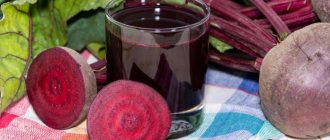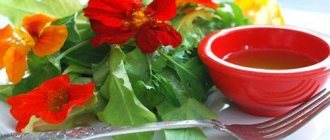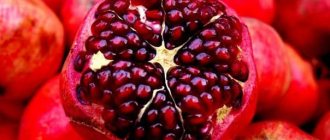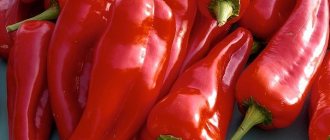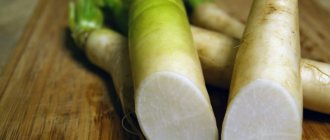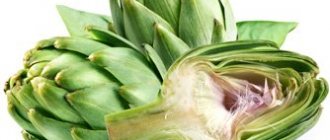Beetroot juice, the benefits and harms of which will be discussed in this article, is especially popular among fans of a healthy lifestyle. For many, this juice remains a mystery and they don’t even know about its beneficial and medicinal properties.
Beets are an amazing root vegetable and are traditionally used to heal many ailments. Even the ancient Romans treated fever and constipation with beets. And Hippocrates strongly recommended using beet leaves to treat wounds. In the Middle Ages, beets were used to treat diseases of the digestive system.
And while many people know about the properties of beets and include them in their diet, only a few know about beet juice. In fact, beet juice has much greater healing properties and effects on the human body. Beetroot juice is especially useful for women during menstrual periods, as well as for people with anemia. And most of its properties are provided by a unique compound called betalain. Betalain contained in beets improves the functions of the liver and biliary tract.
Based on research by British scientists from the University of Exeter, it has become possible to confidently say that beet juice is a unique energy drink.
Therefore, its use is mandatory if there are no contraindications or side effects.
Read on the topic: Red beets beneficial properties and contraindications
Benefits of beet juice for the body
Like regular beets, freshly squeezed and settled juice (only from fresh root vegetables) brings great benefits to the human body and helps:
- Cope with anemia and blood diseases;
- Increase endurance (this occurs by reducing oxygen consumption during exercise by 16%);
- Improve the functioning of the thyroid gland in case of hypothyroidism;
- Strengthen the immune system;
- Strengthen and increase the elasticity of small capillaries;
- In cleansing blood vessels from cholesterol plaques (in general, cholesterol levels are reduced);
- Relieve vascular spasticity;
- Restore vigor in case of spring vitamin deficiency, accompanied by loss of strength;
- Improve memory and concentration;
- Increase the level of performance;
- Improve the functioning of the digestive system;
- Get rid of constipation (has a mild laxative effect);
- Bring the intestinal microflora back to normal;
- Accelerate general metabolism;
- Remove toxic substances from the body (including deposited heavy metals);
- Cleanse the liver and kidneys;
- Remove stones from the gallbladder;
- Remove excess calcium from blood vessels (for example, with varicose veins);
- Stimulate the functioning of the lymphatic system;
- Prevent the occurrence of cancer;
- Increase and maintain male potency (including avoiding the development of prostate adenoma);
- Survive hormonal changes for women during menopause without using synthetic drugs;
- Reduce high blood pressure;
- Get rid of insomnia;
- Stabilize (or rather, reduce) blood glucose levels (thanks to a low glycemic index of only 30 units);
- Heal ulcers and boils when applied externally.
Although for pregnant women the intake of such juice is limited to two tablespoons per day, even this small dosage will help normalize the functioning of all organs and, most importantly, prevent anemia by improving the rate of hematopoiesis.
In cosmetology, it is often recommended to wipe the face with beet juice in order to avoid the appearance of acne and pimples.
Benefits and harms for the human body
Let's look at the benefits and harms of red beet juice. The effect this healing drink has on the body is simply priceless. Due to its rich composition and its beneficial properties, beetroot drink is widely used in both folk and traditional medicine .
How useful:
- Maintains an optimal level of hemoglobin in the blood due to its iron content (read about how beets affect human blood here).
- It copes well with swelling and constipation due to its pronounced diuretic and laxative effect (you can learn more about the prevention and treatment of constipation in adults and children with the help of beets in this article).
- Improves complexion and skin condition in general.
- It has a beneficial effect on blood vessels, thereby lowering blood pressure.
- Helps cleanse the liver, kidneys and blood vessels (you can learn how to cleanse the body with beets here).
- Lowers “bad” cholesterol (read more about whether or not you can eat beets for pancreatitis and cholecystitis and in what form, here).
- Improves the condition of the body as a whole, increases its endurance.
- Due to the low glycemic index, it can be used for weight loss.
- Increases the amount of oxygen that flows to the heart and muscles by dilating blood vessels. The effect is due to the high betaine content.
- Strengthens the immune system.
Unlike root vegetables, juice has a more mildly expressed laxative effect.
In addition, the medicinal properties of freshly squeezed beetroot juice for the nose are well known : it treats various diseases of this organ.
If the juice from the root vegetable is consumed correctly, it will not cause harm to the body.
However, difficulties often arise in selecting the optimal dose, so we will dwell in more detail on possible undesirable consequences.
Harm from drinking beetroot juice:
- The appearance of an allergic reaction in the presence of increased sensitivity of the body. Not often, but this is also possible. Therefore, it is recommended to start drinking juice in a dosage of 30-50 ml at a time. This will avoid possible negative consequences.
- Drinking juice in excessive quantities can cause nausea, stomach pain, diarrhea and even headaches.
As can be seen from the list, if there is any harm from beets, it is very little. You just need to be smart about the amount consumed and conduct a preliminary test to identify a possible allergic reaction.
How to make beet juice at home
At the first stage, you need to choose high-quality beets. It should be elastic-hard, burgundy, red or purple in color and oval-spherical (or simply spherical) in shape. It is recommended to choose fruits that are not too large, up to a maximum of 12 cm in diameter (this way the consumer will eliminate the high content of nitrates in the root crop). When cut, there should be no inclusions of white or black color (this is a sign of spoilage of the beets). The presence of green shoots indicates the “youth” of the vegetable, and therefore its juiciness.
The root vegetable must be washed well and peeled. A juicer is quite suitable for preparing concentrated beet juice. But it also happens that such equipment is not at hand. And that's no problem. You will need to take a fine grater and grate the root vegetable on it. Then the drink is squeezed out through clean gauze folded in several layers.
Are there any contraindications for use?
Eating red beets can cause harm to the body if consumed thoughtlessly, in large quantities and without taking into account the current state of health.
- For gastritis with high acidity, fresh and boiled root vegetables have a negative effect on the stomach;
- Diabetics are allowed to consume a small amount of the vegetable due to the high glucose content in beets;
- It is not recommended to introduce beet into the diet of men prone to frequent diarrhea;
- Hypotension, gout and arthritis impose serious restrictions on juice consumption;
- The vegetable is strictly contraindicated if urolithiasis is diagnosed due to the high level of oxalic acid in beets;
- Despite the fact that beets are indicated for the prevention of osteoporosis, they should not be consumed if the disease has developed - the root vegetable interferes with the absorption of calcium.
How to drink beet juice correctly
Freshly prepared juice should not be drunk immediately. Place it in the refrigerator for approximately two to four hours without covering the container with a lid. Due to this, the juice settles (sediment settles to the bottom) and gets rid of the burning esters. After settling, remove the foam from the surface of the juice and carefully pour it into another jar, leaving the settled sediment.
True, even this juice is not usually consumed in its pure form, but rather diluted with cranberry, orange, cucumber, carrot or celery juice. In this case, the body better absorbs the necessary nutrients. You can mix juices in proportions, for example, 1 part beetroot and 3 parts any other. If it is well tolerated and there are no side effects, you can increase the amount of beet juice.
Pure beet juice is drunk for preventive or therapeutic purposes. Start drinking beetroot juice in small portions, with 1-2 teaspoons, gradually increasing its amount to 50 grams. You need to drink the juice 25-30 minutes before meals.
Treatment with beet juice
Very often, beet juice is taken for medicinal purposes. Although doctors' recommendations for using this juice for therapeutic purposes are not so extensive, there are many examples where beet juice helps improve health.
Red beet juice is recommended for use in complex treatment:
- Constipation, since fiber improves metabolism and has a laxative and weak diuretic effect.
- Hypertension, since it contains sufficient amounts of magnesium;
- Diseases of the thyroid gland. It contains iodine, which is beneficial for this organ, as well as nutrients that improve metabolism;
- Varicose veins and restoration of the cardiovascular system;
- Restoring the menstrual cycle in women and reducing pain;
- Overweight and obesity.
Traditional medicine offers many recipes for the treatment of various pathologies. This juice is used to treat:
- Liver;
- Constipation;
- Anemia;
- Hypertension;
- Runny nose and sinusitis;
- Sore throats.
There are recipes where beet juice is used for medicinal purposes together with other juices. Here are just some of the recipes.
Beetroot and apple juice helps restore stomach function and improve digestion. This juice is useful for preventing cancer.
Beetroot and orange juice helps the body absorb iron better. In addition, orange juice contains a large amount of vitamin C. To prepare this blended drink, the proportion of orange juice should be greater than beet juice. It is better to add more water after cooking. You can read about the benefits of orange juice in this article.
Beet juice with cranberry juice is a good way to cleanse the body of toxins and waste. This drink will help raise blood pressure and has calming properties.
To restore normal functioning of the heart, it is useful to mix beet juice with cucumber and carrot juices, taking more carrot juice.
To restore stomach function, you need to mix beet juice with pumpkin juice. And to cleanse the body of toxins, add honey to the juice.
For weight loss, it is better to mix red beet juice with cucumber juice.
Using these recipes, you can maintain your health, improve the general condition of the whole body and replenish the body with vitamins and minerals, which will certainly affect the immune system.
Beetroot-apple juice - benefits, recommendations for use
Beetroot and apple juice is an ideal gargle for sore throat, pharyngitis, and simply for colds. The main thing is not to add sugar to the product intended for treatment. Also, such fresh juice is very useful for the circulatory system. Since it contains a lot of iron, it can help get rid of anemia. And, of course, it is good for the intestines; the product normalizes peristalsis, which improves the absorption of food and relieves constipation.
Beetroot-apple juice - recommendations for use:
- For the treatment of pathological conditions - 200 ml 2 times a day, an hour after meals. Depending on the severity of the disease, from 10 to 20 days.
- For preventive purposes - 250 ml per hour after meals for three weeks. The course can be repeated every 2 months.
Beetroot juice for weight loss
Everyone knows vegetable diets for weight loss, including beetroot. But few people compare the capabilities of whole beets and their juice.
Indeed, the process of preparing the drink takes quite a long time. But the taste of this product (especially when diluted with another favorite juice) will become more pleasant than consuming ordinary raw beets, which will have to be chewed thoroughly.
The main advantages of beet juice for weight loss are:
- The same content of indigestible fiber, which acts as a “brush”;
- A laxative effect that does not allow toxins and waste to be deposited in the intestines;
- Establishing the processes of absorption of vitamins and microelements by “destructing” bad microflora;
- Low glycemic index.
Although doctors strongly recommend adhering to the rules and not drinking more than three glasses of beet juice per day, it must be diluted, as mentioned earlier, with other vegetable, berry or fruit juice.
You need to start the diet by gradually increasing the amount of beetroot juice you drink in order to monitor the body’s reaction, and drink it half an hour before meals.
Also, during the diet, it is recommended to exclude starchy and fatty foods in order to still get rid of extra pounds, and not just waste products. It is also allowed to do fasting days on beet juice, but provided that there is no negative reaction to such a product.
